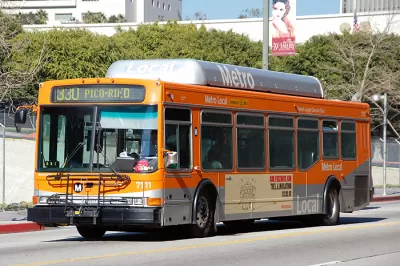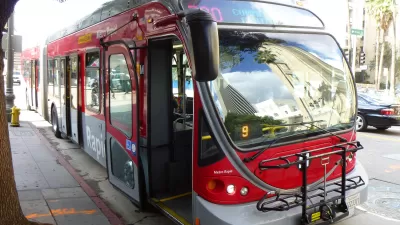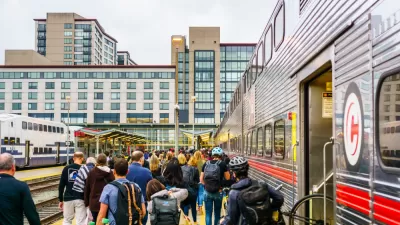With many U.S. transit agencies facing severe gaps in service and budget shortfalls, some advocates argue that improved service matters more than free fares.

Despite a "growing movement" to make public transit fare-free, Henry Grabar argues in a piece for Slate that getting rid of fares would not help the poorest and most underserved transit riders. Jarrett Walker, a Portland-based transit planner and author of Human Transit, agrees. "I’ve heard people describe the free fare movement as being a movement for free, terrible service, and that’s how the trade-off ends up working if you expect this to happen inside the budget of an impoverished American transit agency." While research shows that low-income riders do use transit more when offered discounts, they also "overwhelmingly said reliability was a bigger concern than affordability."
Advocates for free transit argue that it's a matter of priorities. The Los Angeles County Metropolitan Transportation Authority, for example, "spends many times its bus budget on capital projects and highways, funds that could easily be reapportioned to bulk up its transit offerings." Yet "[m]ost transit experts support targeted discount programs for low-income riders, like the one operated by King County, Washington, which runs transit service in Seattle. They also admit they haven’t done a great job helping people access such programs, a point in favor of a 'free school lunch' analogy; benefits are only good if people can get them." Improving accessibility and service, writes Grabar, could do more to increase ridership than free fares. Ultimately, "[r]iders say they want better service, not cheaper service."
Steven Polzin also wrote a detailed cost-benefit analysis of reduced- and free-fare transit for Planetizen in 2018.
FULL STORY: The Problem With Free Transit

Planetizen Federal Action Tracker
A weekly monitor of how Trump’s orders and actions are impacting planners and planning in America.

Maui's Vacation Rental Debate Turns Ugly
Verbal attacks, misinformation campaigns and fistfights plague a high-stakes debate to convert thousands of vacation rentals into long-term housing.

San Francisco Suspends Traffic Calming Amidst Record Deaths
Citing “a challenging fiscal landscape,” the city will cease the program on the heels of 42 traffic deaths, including 24 pedestrians.

Defunct Pittsburgh Power Plant to Become Residential Tower
A decommissioned steam heat plant will be redeveloped into almost 100 affordable housing units.

Trump Prompts Restructuring of Transportation Research Board in “Unprecedented Overreach”
The TRB has eliminated more than half of its committees including those focused on climate, equity, and cities.

Amtrak Rolls Out New Orleans to Alabama “Mardi Gras” Train
The new service will operate morning and evening departures between Mobile and New Orleans.
Urban Design for Planners 1: Software Tools
This six-course series explores essential urban design concepts using open source software and equips planners with the tools they need to participate fully in the urban design process.
Planning for Universal Design
Learn the tools for implementing Universal Design in planning regulations.
Heyer Gruel & Associates PA
JM Goldson LLC
Custer County Colorado
City of Camden Redevelopment Agency
City of Astoria
Transportation Research & Education Center (TREC) at Portland State University
Jefferson Parish Government
Camden Redevelopment Agency
City of Claremont





























